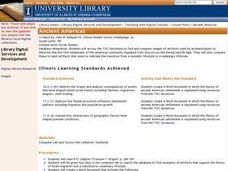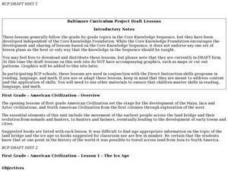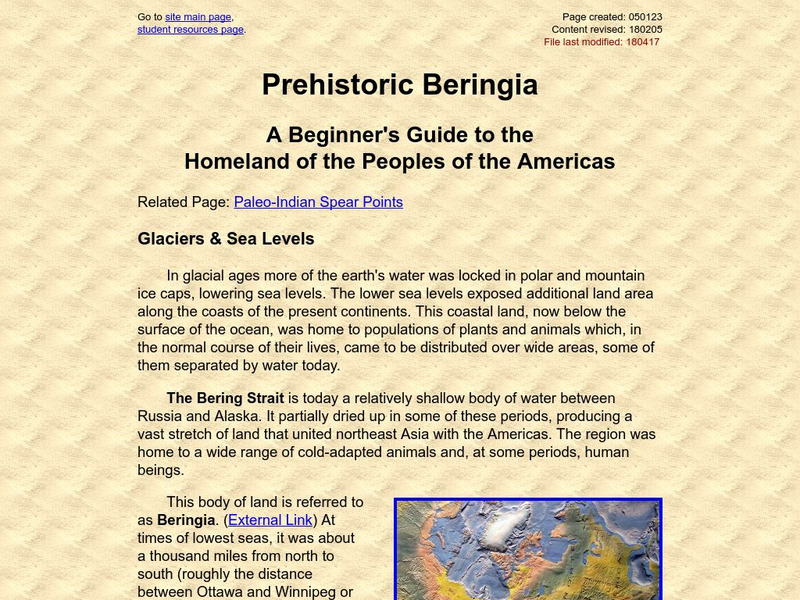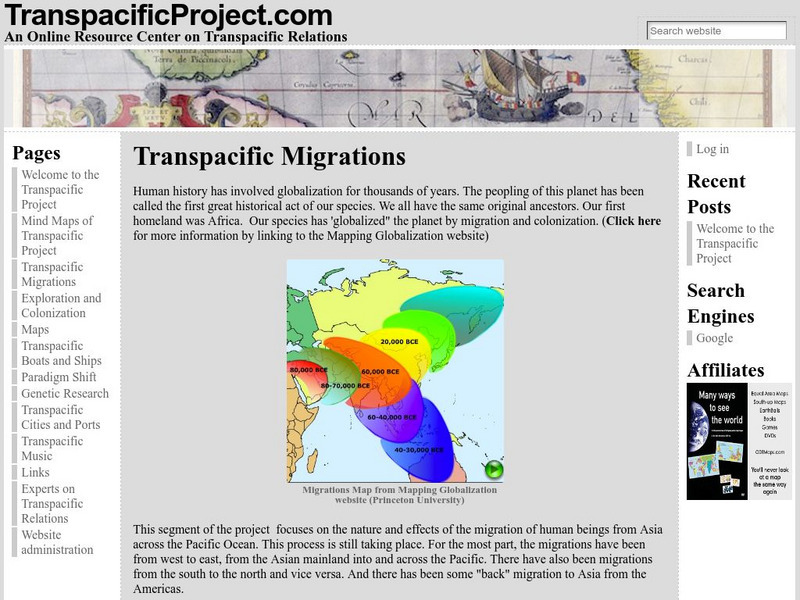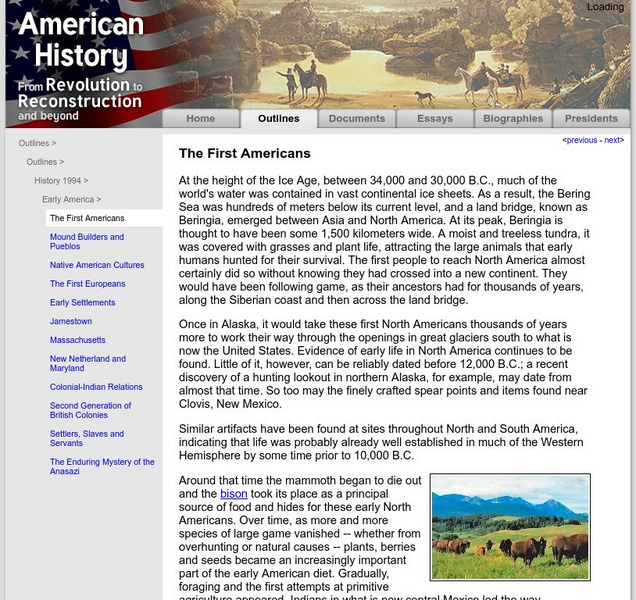Curated OER
Ancient Americas
Seventh graders compare artifacts used by archaeologists to theorize the first inhabitants of the Americas migrated from Asia across the Bering Land Bridge.
Curated OER
Athabaskan Migration & Bering Strait
Students study Athabaskan migration patterns and the Bering Strait Land Bridge theory. They investigate the importance of the expansion of trade and compare the differences between American Indian oral tradition accounts of origin and...
Curated OER
Athabaskan Migration & Bering Strait
Pupils examine the various migration patterns of the Athabaskan. In groups, they discuss the Bering Strait Land Bridge theory of migration and take notes on a lecture from their teacher. To end the lesson, they brainstorm the...
Curated OER
Native American
In this music worksheet, students identify and describe the Native Americans. They respond to several questions about the music of the Native Americans and their dancing. Students also identify and name various musical signs and symbols...
Curated OER
America's Stone Age Explorers
Students watch a Nova program examining the earliest in habitants of the Americas. In groups. they take notes on various topics covered in the program. Among the topics covered are: the Clovis people, Solutrean culture, migration...
Curated OER
American Civilization - The Ice Age
First graders discuss the Ice Age land bridge over the Bering Straits and how it affected the population of the Americas. They construct a clay model of the land bridge and research common animals of the time.
Curated OER
Advanced Critical Reading - Columbian Exchange
In this critical reading worksheet, students read a short passage about the Columbian Exchange and then answer questions based on the reading. Students answer questions by making inferences, determining author's point of view and use...
Curated OER
Boombox Classroom: Native American
In this music instructional activity, students circle names of Native American tribes or nations. They answer three true/false questions. Students answer 3 multiple choice question about the history of Native America. They name 8 music...
Curated OER
The Old North Trail
Students engage in a lesson to find information about the old trails of North America that were used by Native Americans. Specifically, they conduct research to find the history of The Old North Trail. The teacher shares several theories...
Curated OER
National Park Service: Bering Land Bridge National Preserve
Hands-on curriculum unit in which students will explore the Bering Land Bridge National Preserve and learn about the past and present cultures of this arctic landscape. Students will also discover the plants, animals, and geology of this...
Curated OER
National Park Service: Bering Land Bridge Alaska
The National Park Service provides information on a land bridge that connected North America to Siberia. What happened to the 2 mile thick glacier? Find out!
ClassFlow
Class Flow: Land Bridge Theory
[Free Registration/Login Required] This flipchart introduces the Land Bridge Theory. This is a 4th grade lesson.
University of California
Beringia Chronology: Prehistoric Beringia
Extensive coverage of the prehistoric era where groups settled into the region called Beringia from the Bering Land Bridge that once connected North America and Asia. Provides information about various groups, where they settled, and...
University of Wisconsin
The Why Files: Amblin' to Alaska
A look at the new methods of dating the Bering Strait land bridge and the subsequent implications to the peopling of Americas' theories.
Curated OER
National Park Service: What Is Beringia?
This resource provides a brief explanation of Beringia, the geographical region surrounding the Bering Strait.
Other
Trans Pacific Project: Transpacific Migrations
What an incredible resource that looks at Transpacific migrations peopling the Western Hemisphere, the Pacific islands, and the Chinese diaspora. Included is information about genetic research that traces DNA patterns across the world....
Texas A&M University
Csfa: Circum Pacific Research by the Csfa
Center for the Study of the First Americans at Texas A & M University is researching many different sites across North America looking in to theories of "Clovis First" and "Pre-Clovis" as to who were the first people to inhabit North...
University of Groningen
American History: Outlines: Early America: The First Americans
Gives an overview of the timeline of humans establishing themselves in the Americas, starting with the crossing of the Bering Sea land bridge some time before 12,000 B.C. Archaeological evidence shows humans moving south and eventually...
ClassFlow
Class Flow: Unit 1 Early Life in the Western Hemisphere
[Free Registration/Login Required] This flipchart is a great unit for teaching how the early people migrated to the Americas through the Land Bridge Theory and some of the different characteristics of the Native America's culture.
Wikimedia
Wikipedia: Indigenous Peoples of the Americas
Looks at migration theories proposed in regard to the early peopling of the Americas, European colonization, early agriculture and culture. Also looks at contemporary indigenous groups, then groups within each country in the Americas.
University of Groningen
American History: Outlines: The First Americans
Brief overview on the history and theory of migration of the first inhabitants of North America. Links to Wikipedia for definitions are embedded in the text.
University of Iowa
Iowa Office of the State Archaeologist: Early Paleoindian Period
Clovis and Folsom projectile points tell archaeologists a lot about the distribution of Paleoindians across North America. Read about these points, how they were made, and where these points were found in Iowa.
Smithsonian Institution
National Museum of Natural History: American Mammals: Tundra Vole
Tundra Voles have the northernmost distribution of any North American species of Microtus. They are widespread in northern latitudes in Eurasia, too, where they are known as Root Voles, and probably migrated to North America across the...
Other
Phmc: Paleoindian Period: 16,000 to 10,000 Years Ago
A good description of the theories behind the various migration routes into the Americas, the evidence for pre-Clovis culture in the eastern part of America, and a discussion of the paleoindian sites particularly in Pennsylviania.
Other popular searches
- Bering Land Bridge Migration
- Bering Land Bridge Lesson
- Bering Land Bridge Indians
- Bering Land Bridge Ppt
- Bering Land Bridge Pot
- Land Bridge Bering


